Business Ethics and Social Responsibility: A Comparative Analysis
VerifiedAdded on 2020/05/16
|10
|2892
|87
Report
AI Summary
This report delves into comparative business ethics and social responsibility by examining various case studies. The analysis begins with a discussion on financial fraud, exploring contributing factors such as pressure, opportunity, and incentives, drawing insights from a video interview and personal experiences. The report then investigates the Wal-Mart bribery case in Mexico, highlighting unethical business practices, violations of foreign policies, and the impact of globalization. The rise and fall of Arthur Andersen is analyzed, emphasizing the consequences of deviating from ethical principles, the pressure to generate revenue, and the loss of public trust. The report also addresses the broader implications of globalization, including its impact on economic conditions, corruption, and ethical considerations. Finally, the report concludes with an examination of Starbucks' corporate social responsibility initiatives, emphasizing the importance of creating value for employees, communities, and shareholders. The analysis incorporates insights from multiple videos, academic studies, and personal reflections to provide a comprehensive understanding of the complexities and challenges within business ethics and social responsibility.
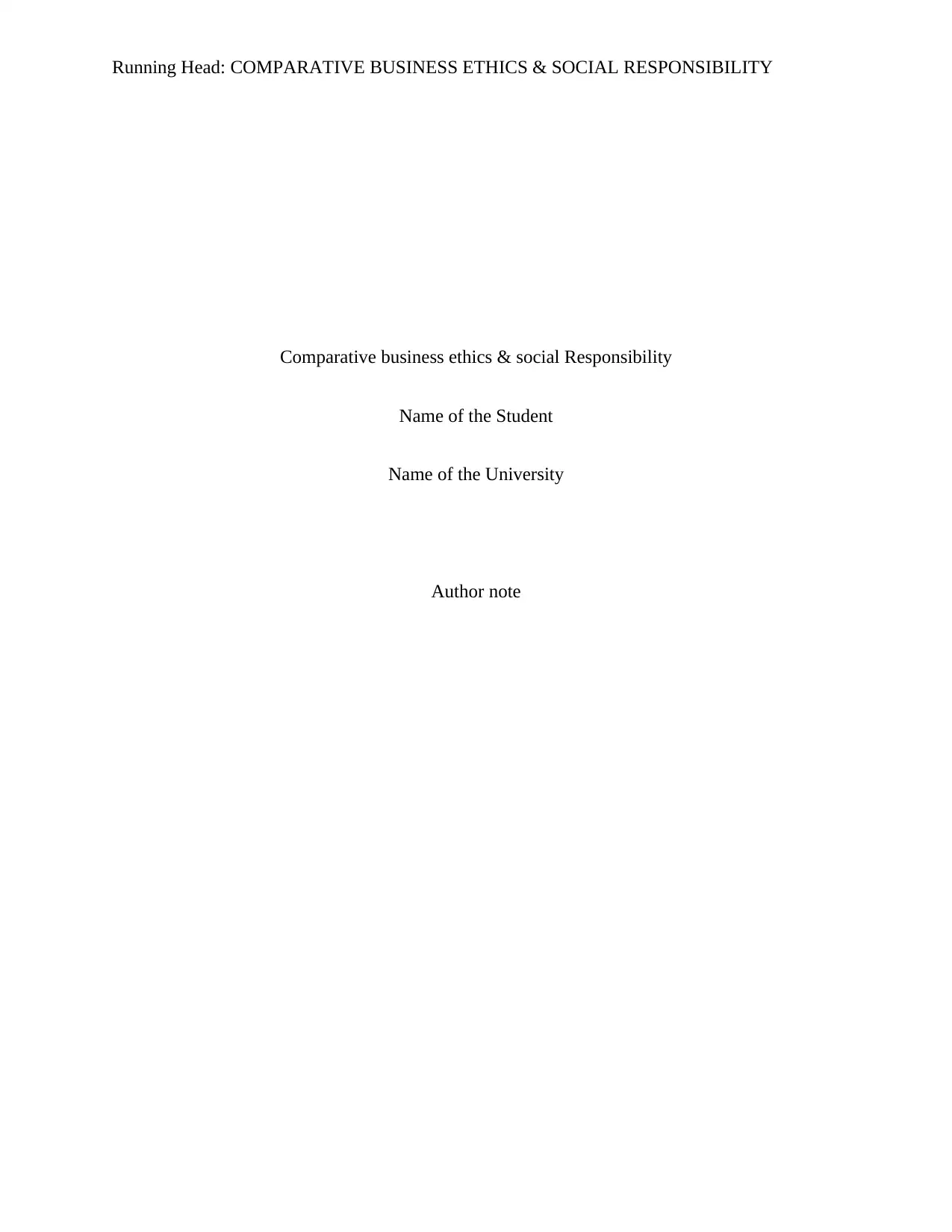
Running Head: COMPARATIVE BUSINESS ETHICS & SOCIAL RESPONSIBILITY
Comparative business ethics & social Responsibility
Name of the Student
Name of the University
Author note
Comparative business ethics & social Responsibility
Name of the Student
Name of the University
Author note
Secure Best Marks with AI Grader
Need help grading? Try our AI Grader for instant feedback on your assignments.
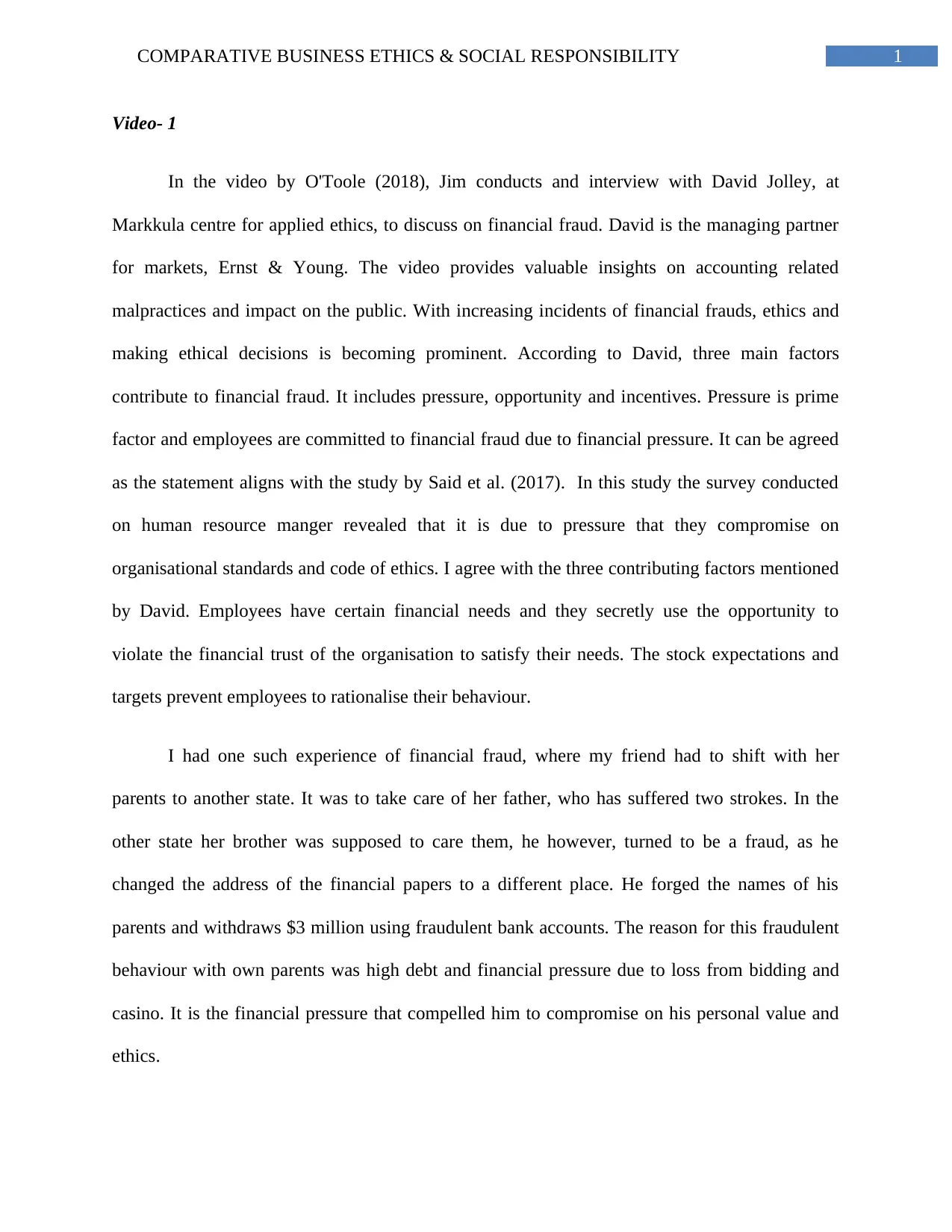
1COMPARATIVE BUSINESS ETHICS & SOCIAL RESPONSIBILITY
Video- 1
In the video by O'Toole (2018), Jim conducts and interview with David Jolley, at
Markkula centre for applied ethics, to discuss on financial fraud. David is the managing partner
for markets, Ernst & Young. The video provides valuable insights on accounting related
malpractices and impact on the public. With increasing incidents of financial frauds, ethics and
making ethical decisions is becoming prominent. According to David, three main factors
contribute to financial fraud. It includes pressure, opportunity and incentives. Pressure is prime
factor and employees are committed to financial fraud due to financial pressure. It can be agreed
as the statement aligns with the study by Said et al. (2017). In this study the survey conducted
on human resource manger revealed that it is due to pressure that they compromise on
organisational standards and code of ethics. I agree with the three contributing factors mentioned
by David. Employees have certain financial needs and they secretly use the opportunity to
violate the financial trust of the organisation to satisfy their needs. The stock expectations and
targets prevent employees to rationalise their behaviour.
I had one such experience of financial fraud, where my friend had to shift with her
parents to another state. It was to take care of her father, who has suffered two strokes. In the
other state her brother was supposed to care them, he however, turned to be a fraud, as he
changed the address of the financial papers to a different place. He forged the names of his
parents and withdraws $3 million using fraudulent bank accounts. The reason for this fraudulent
behaviour with own parents was high debt and financial pressure due to loss from bidding and
casino. It is the financial pressure that compelled him to compromise on his personal value and
ethics.
Video- 1
In the video by O'Toole (2018), Jim conducts and interview with David Jolley, at
Markkula centre for applied ethics, to discuss on financial fraud. David is the managing partner
for markets, Ernst & Young. The video provides valuable insights on accounting related
malpractices and impact on the public. With increasing incidents of financial frauds, ethics and
making ethical decisions is becoming prominent. According to David, three main factors
contribute to financial fraud. It includes pressure, opportunity and incentives. Pressure is prime
factor and employees are committed to financial fraud due to financial pressure. It can be agreed
as the statement aligns with the study by Said et al. (2017). In this study the survey conducted
on human resource manger revealed that it is due to pressure that they compromise on
organisational standards and code of ethics. I agree with the three contributing factors mentioned
by David. Employees have certain financial needs and they secretly use the opportunity to
violate the financial trust of the organisation to satisfy their needs. The stock expectations and
targets prevent employees to rationalise their behaviour.
I had one such experience of financial fraud, where my friend had to shift with her
parents to another state. It was to take care of her father, who has suffered two strokes. In the
other state her brother was supposed to care them, he however, turned to be a fraud, as he
changed the address of the financial papers to a different place. He forged the names of his
parents and withdraws $3 million using fraudulent bank accounts. The reason for this fraudulent
behaviour with own parents was high debt and financial pressure due to loss from bidding and
casino. It is the financial pressure that compelled him to compromise on his personal value and
ethics.
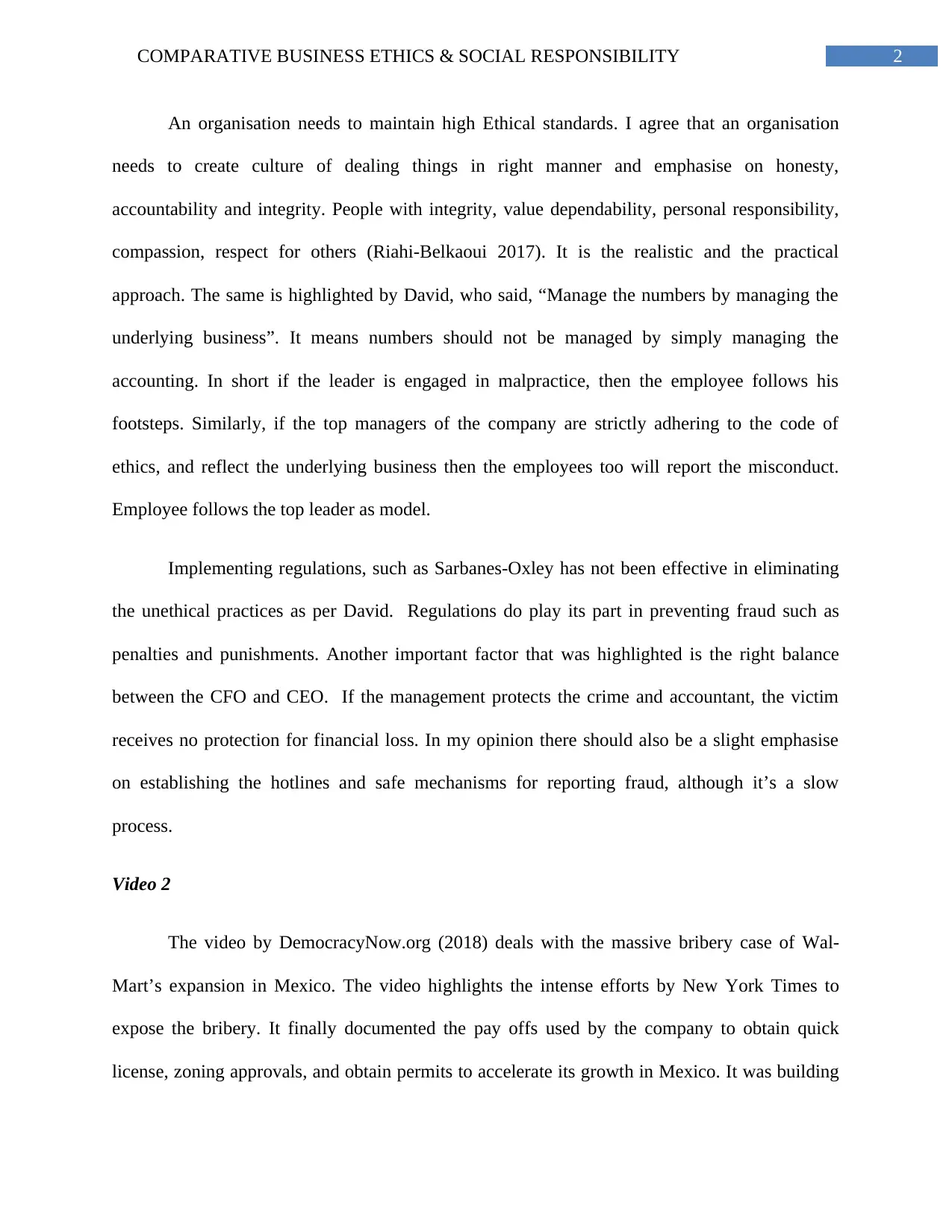
2COMPARATIVE BUSINESS ETHICS & SOCIAL RESPONSIBILITY
An organisation needs to maintain high Ethical standards. I agree that an organisation
needs to create culture of dealing things in right manner and emphasise on honesty,
accountability and integrity. People with integrity, value dependability, personal responsibility,
compassion, respect for others (Riahi-Belkaoui 2017). It is the realistic and the practical
approach. The same is highlighted by David, who said, “Manage the numbers by managing the
underlying business”. It means numbers should not be managed by simply managing the
accounting. In short if the leader is engaged in malpractice, then the employee follows his
footsteps. Similarly, if the top managers of the company are strictly adhering to the code of
ethics, and reflect the underlying business then the employees too will report the misconduct.
Employee follows the top leader as model.
Implementing regulations, such as Sarbanes-Oxley has not been effective in eliminating
the unethical practices as per David. Regulations do play its part in preventing fraud such as
penalties and punishments. Another important factor that was highlighted is the right balance
between the CFO and CEO. If the management protects the crime and accountant, the victim
receives no protection for financial loss. In my opinion there should also be a slight emphasise
on establishing the hotlines and safe mechanisms for reporting fraud, although it’s a slow
process.
Video 2
The video by DemocracyNow.org (2018) deals with the massive bribery case of Wal-
Mart’s expansion in Mexico. The video highlights the intense efforts by New York Times to
expose the bribery. It finally documented the pay offs used by the company to obtain quick
license, zoning approvals, and obtain permits to accelerate its growth in Mexico. It was building
An organisation needs to maintain high Ethical standards. I agree that an organisation
needs to create culture of dealing things in right manner and emphasise on honesty,
accountability and integrity. People with integrity, value dependability, personal responsibility,
compassion, respect for others (Riahi-Belkaoui 2017). It is the realistic and the practical
approach. The same is highlighted by David, who said, “Manage the numbers by managing the
underlying business”. It means numbers should not be managed by simply managing the
accounting. In short if the leader is engaged in malpractice, then the employee follows his
footsteps. Similarly, if the top managers of the company are strictly adhering to the code of
ethics, and reflect the underlying business then the employees too will report the misconduct.
Employee follows the top leader as model.
Implementing regulations, such as Sarbanes-Oxley has not been effective in eliminating
the unethical practices as per David. Regulations do play its part in preventing fraud such as
penalties and punishments. Another important factor that was highlighted is the right balance
between the CFO and CEO. If the management protects the crime and accountant, the victim
receives no protection for financial loss. In my opinion there should also be a slight emphasise
on establishing the hotlines and safe mechanisms for reporting fraud, although it’s a slow
process.
Video 2
The video by DemocracyNow.org (2018) deals with the massive bribery case of Wal-
Mart’s expansion in Mexico. The video highlights the intense efforts by New York Times to
expose the bribery. It finally documented the pay offs used by the company to obtain quick
license, zoning approvals, and obtain permits to accelerate its growth in Mexico. It was building
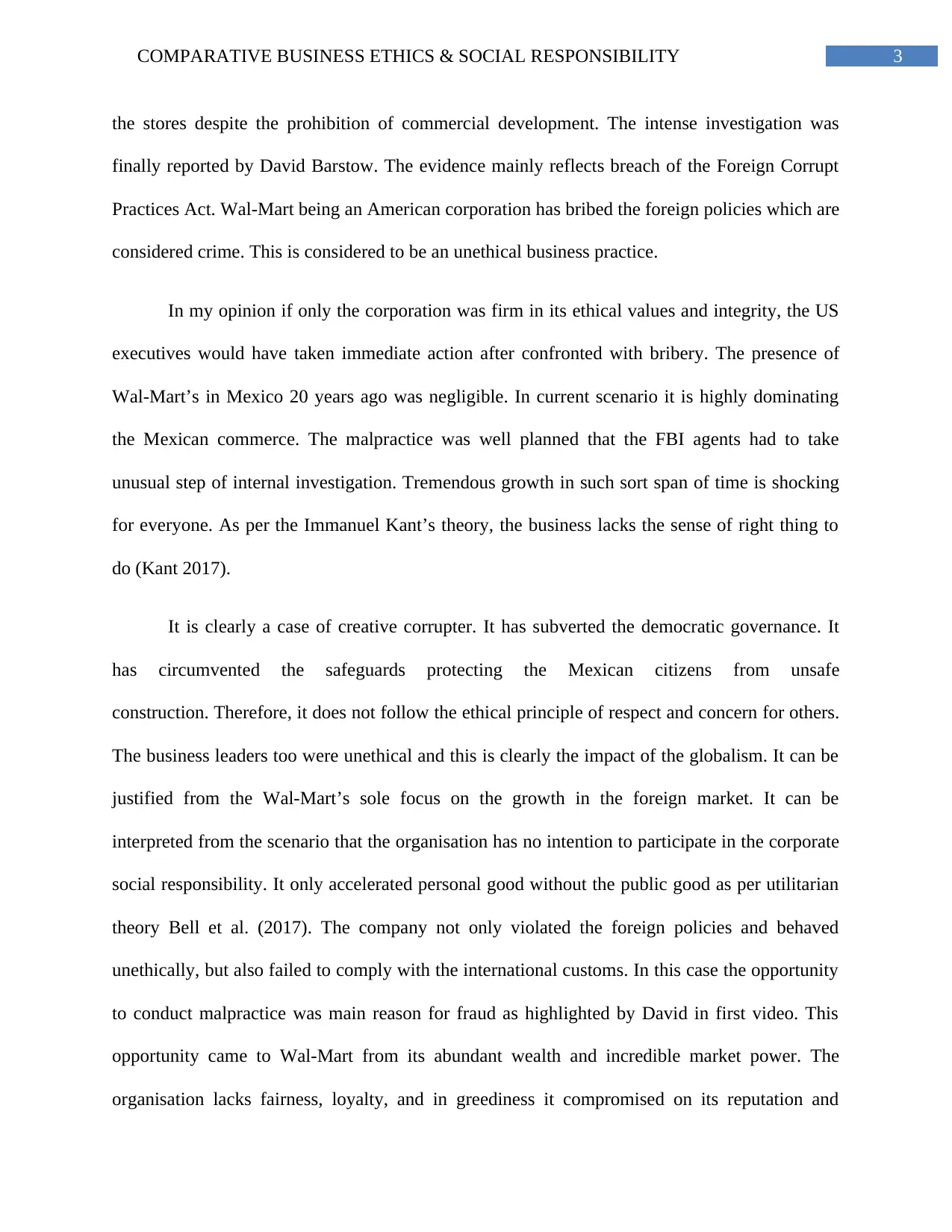
3COMPARATIVE BUSINESS ETHICS & SOCIAL RESPONSIBILITY
the stores despite the prohibition of commercial development. The intense investigation was
finally reported by David Barstow. The evidence mainly reflects breach of the Foreign Corrupt
Practices Act. Wal-Mart being an American corporation has bribed the foreign policies which are
considered crime. This is considered to be an unethical business practice.
In my opinion if only the corporation was firm in its ethical values and integrity, the US
executives would have taken immediate action after confronted with bribery. The presence of
Wal-Mart’s in Mexico 20 years ago was negligible. In current scenario it is highly dominating
the Mexican commerce. The malpractice was well planned that the FBI agents had to take
unusual step of internal investigation. Tremendous growth in such sort span of time is shocking
for everyone. As per the Immanuel Kant’s theory, the business lacks the sense of right thing to
do (Kant 2017).
It is clearly a case of creative corrupter. It has subverted the democratic governance. It
has circumvented the safeguards protecting the Mexican citizens from unsafe
construction. Therefore, it does not follow the ethical principle of respect and concern for others.
The business leaders too were unethical and this is clearly the impact of the globalism. It can be
justified from the Wal-Mart’s sole focus on the growth in the foreign market. It can be
interpreted from the scenario that the organisation has no intention to participate in the corporate
social responsibility. It only accelerated personal good without the public good as per utilitarian
theory Bell et al. (2017). The company not only violated the foreign policies and behaved
unethically, but also failed to comply with the international customs. In this case the opportunity
to conduct malpractice was main reason for fraud as highlighted by David in first video. This
opportunity came to Wal-Mart from its abundant wealth and incredible market power. The
organisation lacks fairness, loyalty, and in greediness it compromised on its reputation and
the stores despite the prohibition of commercial development. The intense investigation was
finally reported by David Barstow. The evidence mainly reflects breach of the Foreign Corrupt
Practices Act. Wal-Mart being an American corporation has bribed the foreign policies which are
considered crime. This is considered to be an unethical business practice.
In my opinion if only the corporation was firm in its ethical values and integrity, the US
executives would have taken immediate action after confronted with bribery. The presence of
Wal-Mart’s in Mexico 20 years ago was negligible. In current scenario it is highly dominating
the Mexican commerce. The malpractice was well planned that the FBI agents had to take
unusual step of internal investigation. Tremendous growth in such sort span of time is shocking
for everyone. As per the Immanuel Kant’s theory, the business lacks the sense of right thing to
do (Kant 2017).
It is clearly a case of creative corrupter. It has subverted the democratic governance. It
has circumvented the safeguards protecting the Mexican citizens from unsafe
construction. Therefore, it does not follow the ethical principle of respect and concern for others.
The business leaders too were unethical and this is clearly the impact of the globalism. It can be
justified from the Wal-Mart’s sole focus on the growth in the foreign market. It can be
interpreted from the scenario that the organisation has no intention to participate in the corporate
social responsibility. It only accelerated personal good without the public good as per utilitarian
theory Bell et al. (2017). The company not only violated the foreign policies and behaved
unethically, but also failed to comply with the international customs. In this case the opportunity
to conduct malpractice was main reason for fraud as highlighted by David in first video. This
opportunity came to Wal-Mart from its abundant wealth and incredible market power. The
organisation lacks fairness, loyalty, and in greediness it compromised on its reputation and
Secure Best Marks with AI Grader
Need help grading? Try our AI Grader for instant feedback on your assignments.
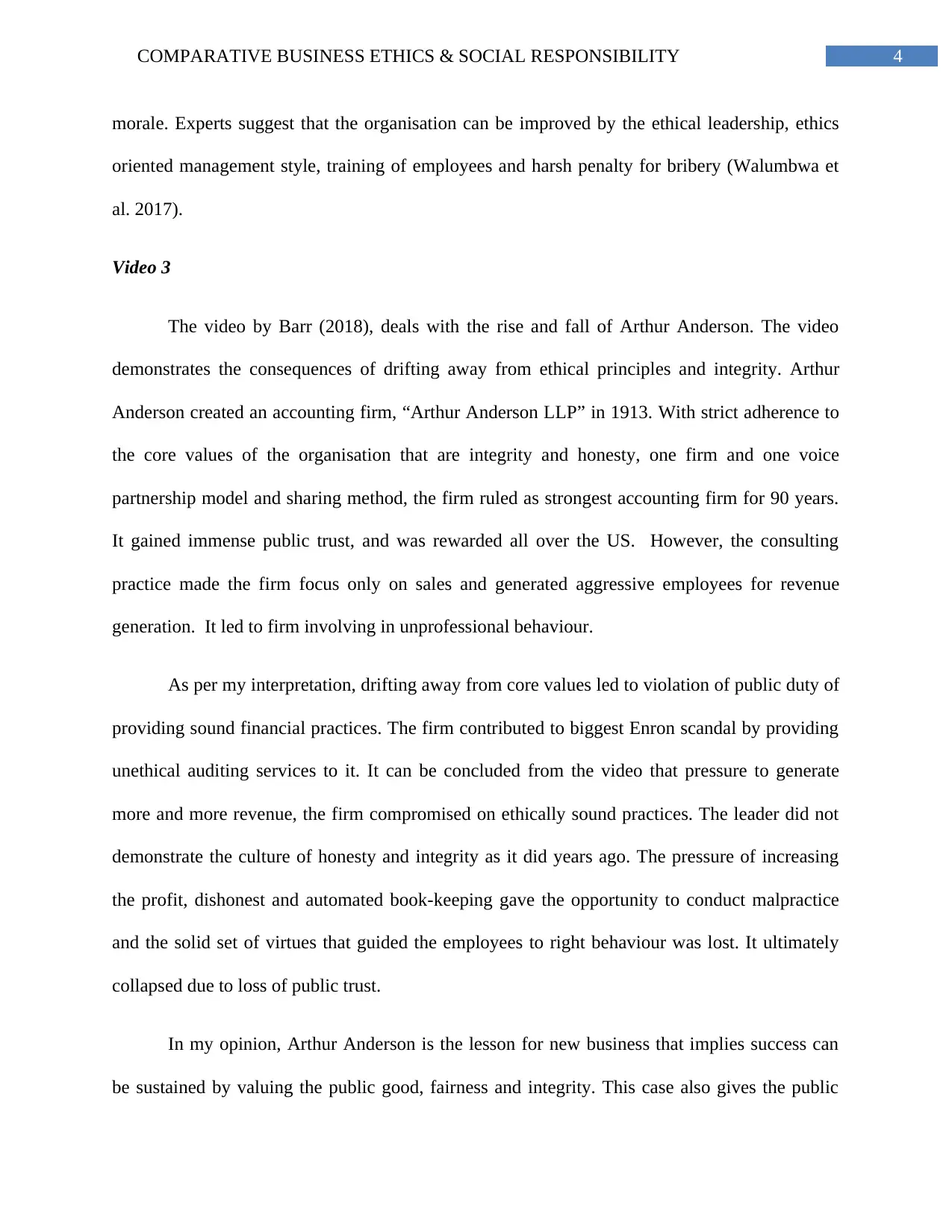
4COMPARATIVE BUSINESS ETHICS & SOCIAL RESPONSIBILITY
morale. Experts suggest that the organisation can be improved by the ethical leadership, ethics
oriented management style, training of employees and harsh penalty for bribery (Walumbwa et
al. 2017).
Video 3
The video by Barr (2018), deals with the rise and fall of Arthur Anderson. The video
demonstrates the consequences of drifting away from ethical principles and integrity. Arthur
Anderson created an accounting firm, “Arthur Anderson LLP” in 1913. With strict adherence to
the core values of the organisation that are integrity and honesty, one firm and one voice
partnership model and sharing method, the firm ruled as strongest accounting firm for 90 years.
It gained immense public trust, and was rewarded all over the US. However, the consulting
practice made the firm focus only on sales and generated aggressive employees for revenue
generation. It led to firm involving in unprofessional behaviour.
As per my interpretation, drifting away from core values led to violation of public duty of
providing sound financial practices. The firm contributed to biggest Enron scandal by providing
unethical auditing services to it. It can be concluded from the video that pressure to generate
more and more revenue, the firm compromised on ethically sound practices. The leader did not
demonstrate the culture of honesty and integrity as it did years ago. The pressure of increasing
the profit, dishonest and automated book-keeping gave the opportunity to conduct malpractice
and the solid set of virtues that guided the employees to right behaviour was lost. It ultimately
collapsed due to loss of public trust.
In my opinion, Arthur Anderson is the lesson for new business that implies success can
be sustained by valuing the public good, fairness and integrity. This case also gives the public
morale. Experts suggest that the organisation can be improved by the ethical leadership, ethics
oriented management style, training of employees and harsh penalty for bribery (Walumbwa et
al. 2017).
Video 3
The video by Barr (2018), deals with the rise and fall of Arthur Anderson. The video
demonstrates the consequences of drifting away from ethical principles and integrity. Arthur
Anderson created an accounting firm, “Arthur Anderson LLP” in 1913. With strict adherence to
the core values of the organisation that are integrity and honesty, one firm and one voice
partnership model and sharing method, the firm ruled as strongest accounting firm for 90 years.
It gained immense public trust, and was rewarded all over the US. However, the consulting
practice made the firm focus only on sales and generated aggressive employees for revenue
generation. It led to firm involving in unprofessional behaviour.
As per my interpretation, drifting away from core values led to violation of public duty of
providing sound financial practices. The firm contributed to biggest Enron scandal by providing
unethical auditing services to it. It can be concluded from the video that pressure to generate
more and more revenue, the firm compromised on ethically sound practices. The leader did not
demonstrate the culture of honesty and integrity as it did years ago. The pressure of increasing
the profit, dishonest and automated book-keeping gave the opportunity to conduct malpractice
and the solid set of virtues that guided the employees to right behaviour was lost. It ultimately
collapsed due to loss of public trust.
In my opinion, Arthur Anderson is the lesson for new business that implies success can
be sustained by valuing the public good, fairness and integrity. This case also gives the public
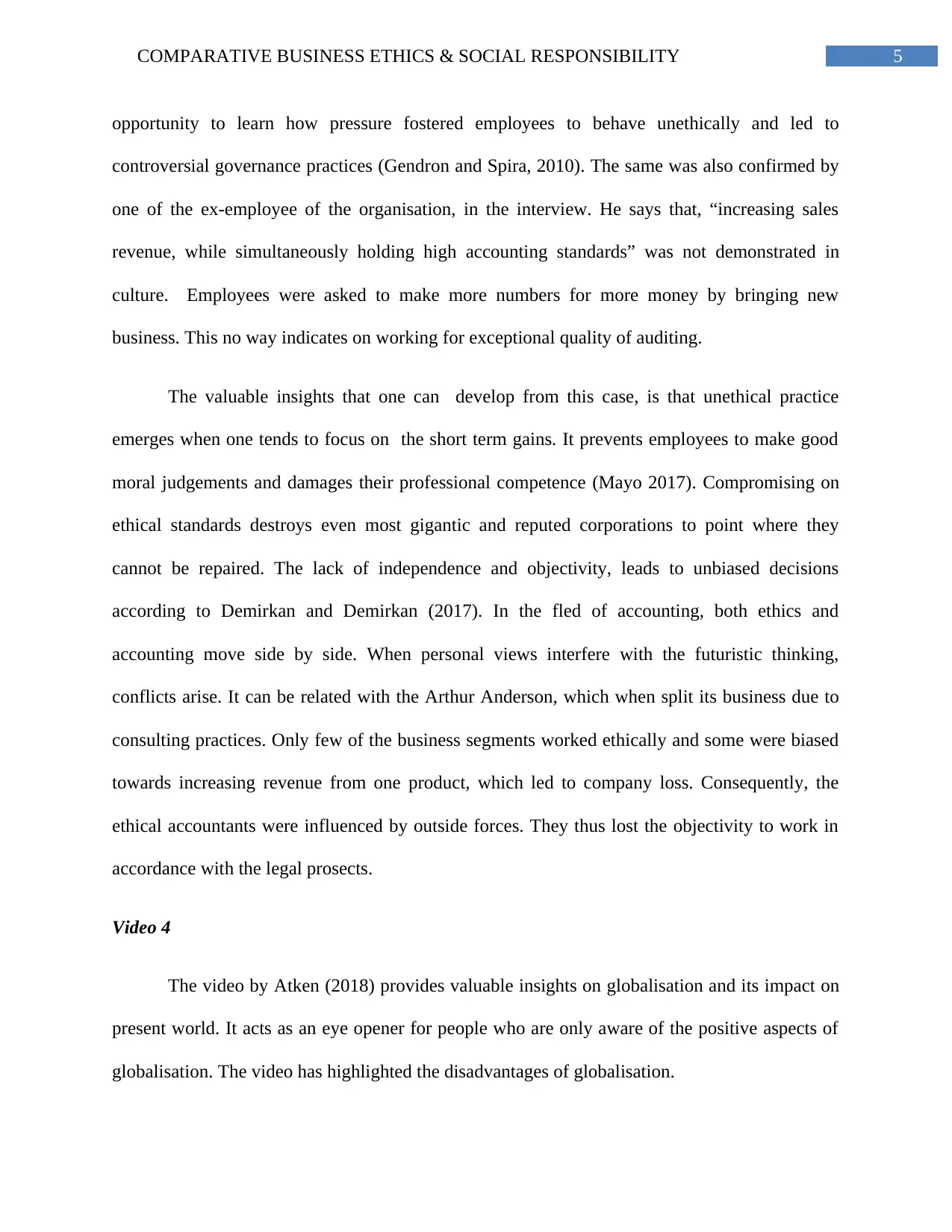
5COMPARATIVE BUSINESS ETHICS & SOCIAL RESPONSIBILITY
opportunity to learn how pressure fostered employees to behave unethically and led to
controversial governance practices (Gendron and Spira, 2010). The same was also confirmed by
one of the ex-employee of the organisation, in the interview. He says that, “increasing sales
revenue, while simultaneously holding high accounting standards” was not demonstrated in
culture. Employees were asked to make more numbers for more money by bringing new
business. This no way indicates on working for exceptional quality of auditing.
The valuable insights that one can develop from this case, is that unethical practice
emerges when one tends to focus on the short term gains. It prevents employees to make good
moral judgements and damages their professional competence (Mayo 2017). Compromising on
ethical standards destroys even most gigantic and reputed corporations to point where they
cannot be repaired. The lack of independence and objectivity, leads to unbiased decisions
according to Demirkan and Demirkan (2017). In the fled of accounting, both ethics and
accounting move side by side. When personal views interfere with the futuristic thinking,
conflicts arise. It can be related with the Arthur Anderson, which when split its business due to
consulting practices. Only few of the business segments worked ethically and some were biased
towards increasing revenue from one product, which led to company loss. Consequently, the
ethical accountants were influenced by outside forces. They thus lost the objectivity to work in
accordance with the legal prosects.
Video 4
The video by Atken (2018) provides valuable insights on globalisation and its impact on
present world. It acts as an eye opener for people who are only aware of the positive aspects of
globalisation. The video has highlighted the disadvantages of globalisation.
opportunity to learn how pressure fostered employees to behave unethically and led to
controversial governance practices (Gendron and Spira, 2010). The same was also confirmed by
one of the ex-employee of the organisation, in the interview. He says that, “increasing sales
revenue, while simultaneously holding high accounting standards” was not demonstrated in
culture. Employees were asked to make more numbers for more money by bringing new
business. This no way indicates on working for exceptional quality of auditing.
The valuable insights that one can develop from this case, is that unethical practice
emerges when one tends to focus on the short term gains. It prevents employees to make good
moral judgements and damages their professional competence (Mayo 2017). Compromising on
ethical standards destroys even most gigantic and reputed corporations to point where they
cannot be repaired. The lack of independence and objectivity, leads to unbiased decisions
according to Demirkan and Demirkan (2017). In the fled of accounting, both ethics and
accounting move side by side. When personal views interfere with the futuristic thinking,
conflicts arise. It can be related with the Arthur Anderson, which when split its business due to
consulting practices. Only few of the business segments worked ethically and some were biased
towards increasing revenue from one product, which led to company loss. Consequently, the
ethical accountants were influenced by outside forces. They thus lost the objectivity to work in
accordance with the legal prosects.
Video 4
The video by Atken (2018) provides valuable insights on globalisation and its impact on
present world. It acts as an eye opener for people who are only aware of the positive aspects of
globalisation. The video has highlighted the disadvantages of globalisation.
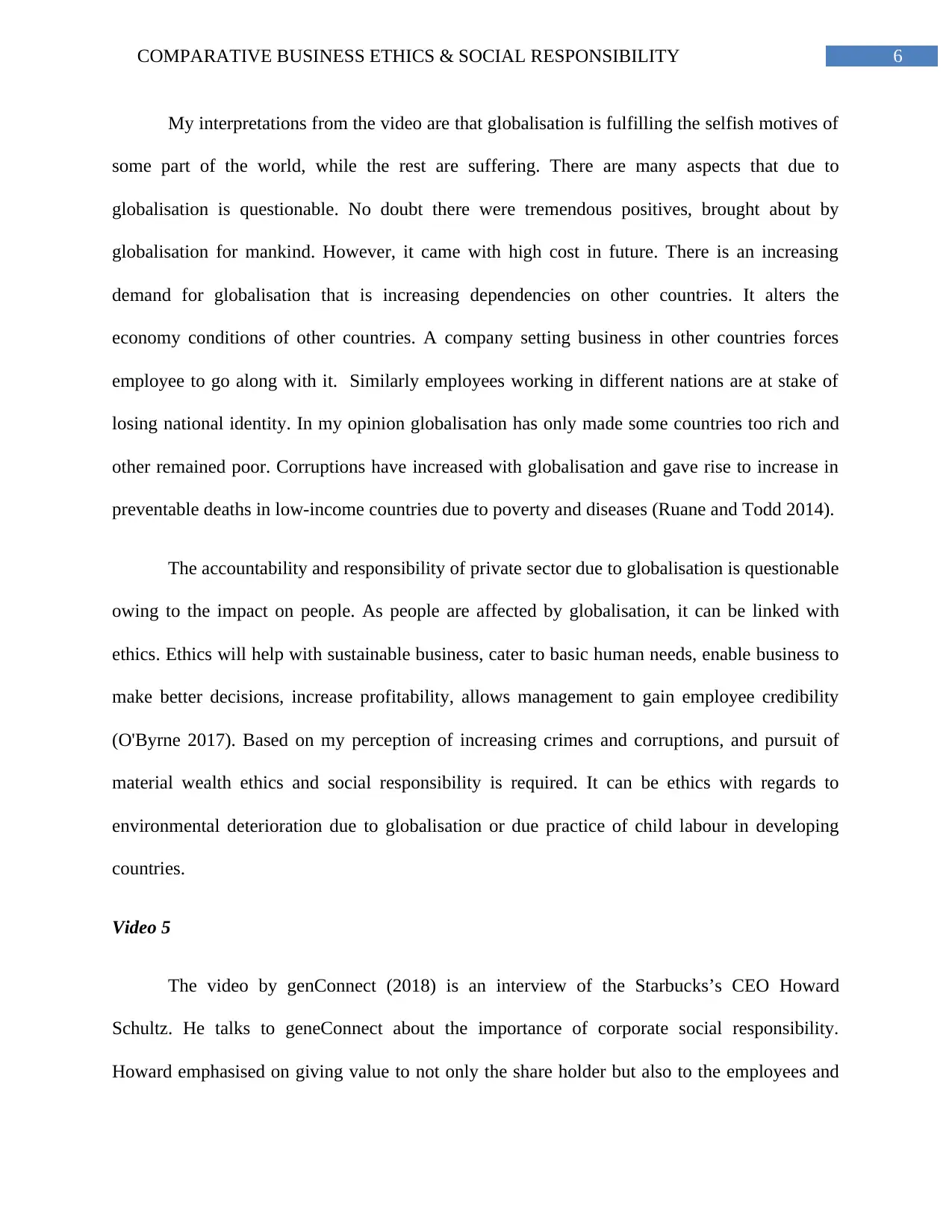
6COMPARATIVE BUSINESS ETHICS & SOCIAL RESPONSIBILITY
My interpretations from the video are that globalisation is fulfilling the selfish motives of
some part of the world, while the rest are suffering. There are many aspects that due to
globalisation is questionable. No doubt there were tremendous positives, brought about by
globalisation for mankind. However, it came with high cost in future. There is an increasing
demand for globalisation that is increasing dependencies on other countries. It alters the
economy conditions of other countries. A company setting business in other countries forces
employee to go along with it. Similarly employees working in different nations are at stake of
losing national identity. In my opinion globalisation has only made some countries too rich and
other remained poor. Corruptions have increased with globalisation and gave rise to increase in
preventable deaths in low-income countries due to poverty and diseases (Ruane and Todd 2014).
The accountability and responsibility of private sector due to globalisation is questionable
owing to the impact on people. As people are affected by globalisation, it can be linked with
ethics. Ethics will help with sustainable business, cater to basic human needs, enable business to
make better decisions, increase profitability, allows management to gain employee credibility
(O'Byrne 2017). Based on my perception of increasing crimes and corruptions, and pursuit of
material wealth ethics and social responsibility is required. It can be ethics with regards to
environmental deterioration due to globalisation or due practice of child labour in developing
countries.
Video 5
The video by genConnect (2018) is an interview of the Starbucks’s CEO Howard
Schultz. He talks to geneConnect about the importance of corporate social responsibility.
Howard emphasised on giving value to not only the share holder but also to the employees and
My interpretations from the video are that globalisation is fulfilling the selfish motives of
some part of the world, while the rest are suffering. There are many aspects that due to
globalisation is questionable. No doubt there were tremendous positives, brought about by
globalisation for mankind. However, it came with high cost in future. There is an increasing
demand for globalisation that is increasing dependencies on other countries. It alters the
economy conditions of other countries. A company setting business in other countries forces
employee to go along with it. Similarly employees working in different nations are at stake of
losing national identity. In my opinion globalisation has only made some countries too rich and
other remained poor. Corruptions have increased with globalisation and gave rise to increase in
preventable deaths in low-income countries due to poverty and diseases (Ruane and Todd 2014).
The accountability and responsibility of private sector due to globalisation is questionable
owing to the impact on people. As people are affected by globalisation, it can be linked with
ethics. Ethics will help with sustainable business, cater to basic human needs, enable business to
make better decisions, increase profitability, allows management to gain employee credibility
(O'Byrne 2017). Based on my perception of increasing crimes and corruptions, and pursuit of
material wealth ethics and social responsibility is required. It can be ethics with regards to
environmental deterioration due to globalisation or due practice of child labour in developing
countries.
Video 5
The video by genConnect (2018) is an interview of the Starbucks’s CEO Howard
Schultz. He talks to geneConnect about the importance of corporate social responsibility.
Howard emphasised on giving value to not only the share holder but also to the employees and
Paraphrase This Document
Need a fresh take? Get an instant paraphrase of this document with our AI Paraphraser
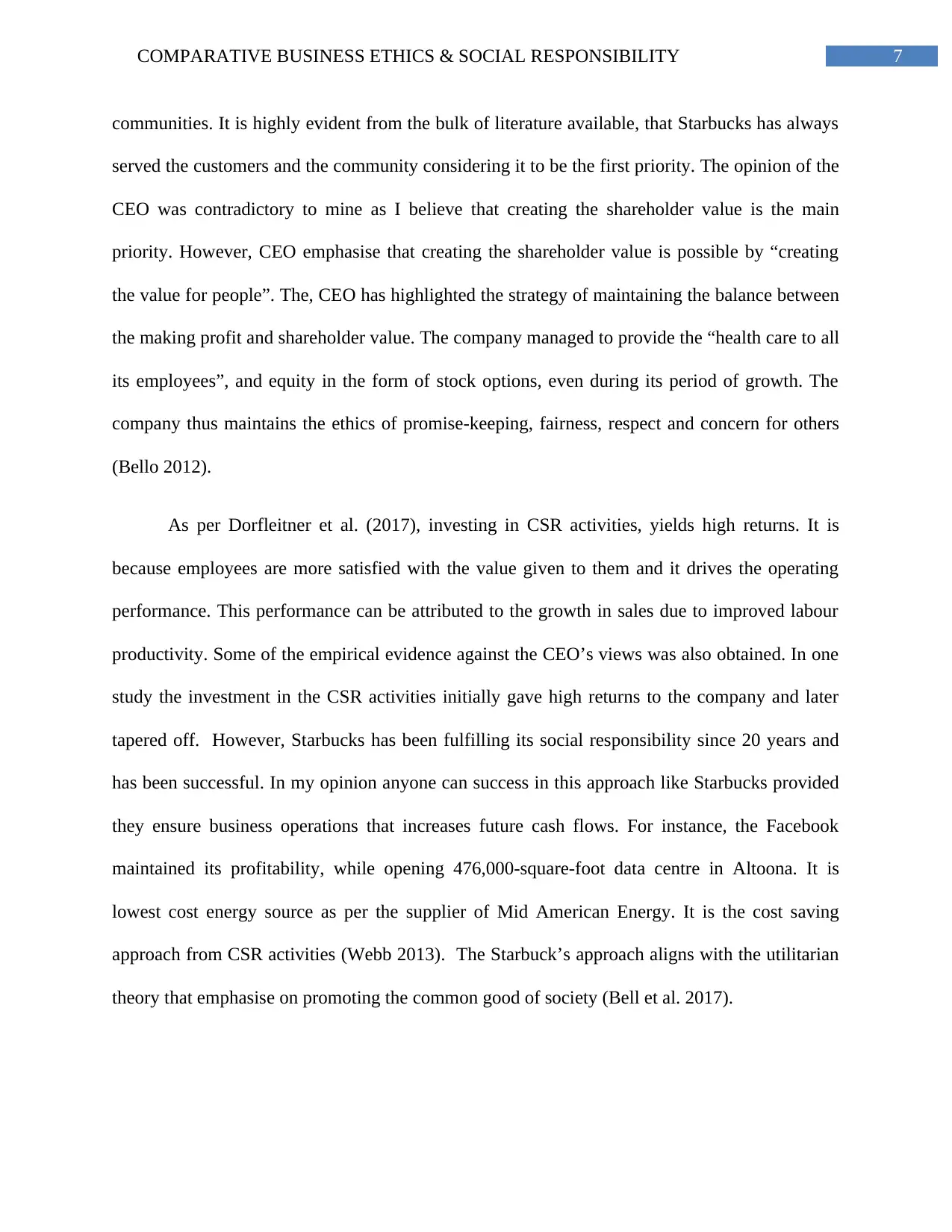
7COMPARATIVE BUSINESS ETHICS & SOCIAL RESPONSIBILITY
communities. It is highly evident from the bulk of literature available, that Starbucks has always
served the customers and the community considering it to be the first priority. The opinion of the
CEO was contradictory to mine as I believe that creating the shareholder value is the main
priority. However, CEO emphasise that creating the shareholder value is possible by “creating
the value for people”. The, CEO has highlighted the strategy of maintaining the balance between
the making profit and shareholder value. The company managed to provide the “health care to all
its employees”, and equity in the form of stock options, even during its period of growth. The
company thus maintains the ethics of promise-keeping, fairness, respect and concern for others
(Bello 2012).
As per Dorfleitner et al. (2017), investing in CSR activities, yields high returns. It is
because employees are more satisfied with the value given to them and it drives the operating
performance. This performance can be attributed to the growth in sales due to improved labour
productivity. Some of the empirical evidence against the CEO’s views was also obtained. In one
study the investment in the CSR activities initially gave high returns to the company and later
tapered off. However, Starbucks has been fulfilling its social responsibility since 20 years and
has been successful. In my opinion anyone can success in this approach like Starbucks provided
they ensure business operations that increases future cash flows. For instance, the Facebook
maintained its profitability, while opening 476,000-square-foot data centre in Altoona. It is
lowest cost energy source as per the supplier of Mid American Energy. It is the cost saving
approach from CSR activities (Webb 2013). The Starbuck’s approach aligns with the utilitarian
theory that emphasise on promoting the common good of society (Bell et al. 2017).
communities. It is highly evident from the bulk of literature available, that Starbucks has always
served the customers and the community considering it to be the first priority. The opinion of the
CEO was contradictory to mine as I believe that creating the shareholder value is the main
priority. However, CEO emphasise that creating the shareholder value is possible by “creating
the value for people”. The, CEO has highlighted the strategy of maintaining the balance between
the making profit and shareholder value. The company managed to provide the “health care to all
its employees”, and equity in the form of stock options, even during its period of growth. The
company thus maintains the ethics of promise-keeping, fairness, respect and concern for others
(Bello 2012).
As per Dorfleitner et al. (2017), investing in CSR activities, yields high returns. It is
because employees are more satisfied with the value given to them and it drives the operating
performance. This performance can be attributed to the growth in sales due to improved labour
productivity. Some of the empirical evidence against the CEO’s views was also obtained. In one
study the investment in the CSR activities initially gave high returns to the company and later
tapered off. However, Starbucks has been fulfilling its social responsibility since 20 years and
has been successful. In my opinion anyone can success in this approach like Starbucks provided
they ensure business operations that increases future cash flows. For instance, the Facebook
maintained its profitability, while opening 476,000-square-foot data centre in Altoona. It is
lowest cost energy source as per the supplier of Mid American Energy. It is the cost saving
approach from CSR activities (Webb 2013). The Starbuck’s approach aligns with the utilitarian
theory that emphasise on promoting the common good of society (Bell et al. 2017).
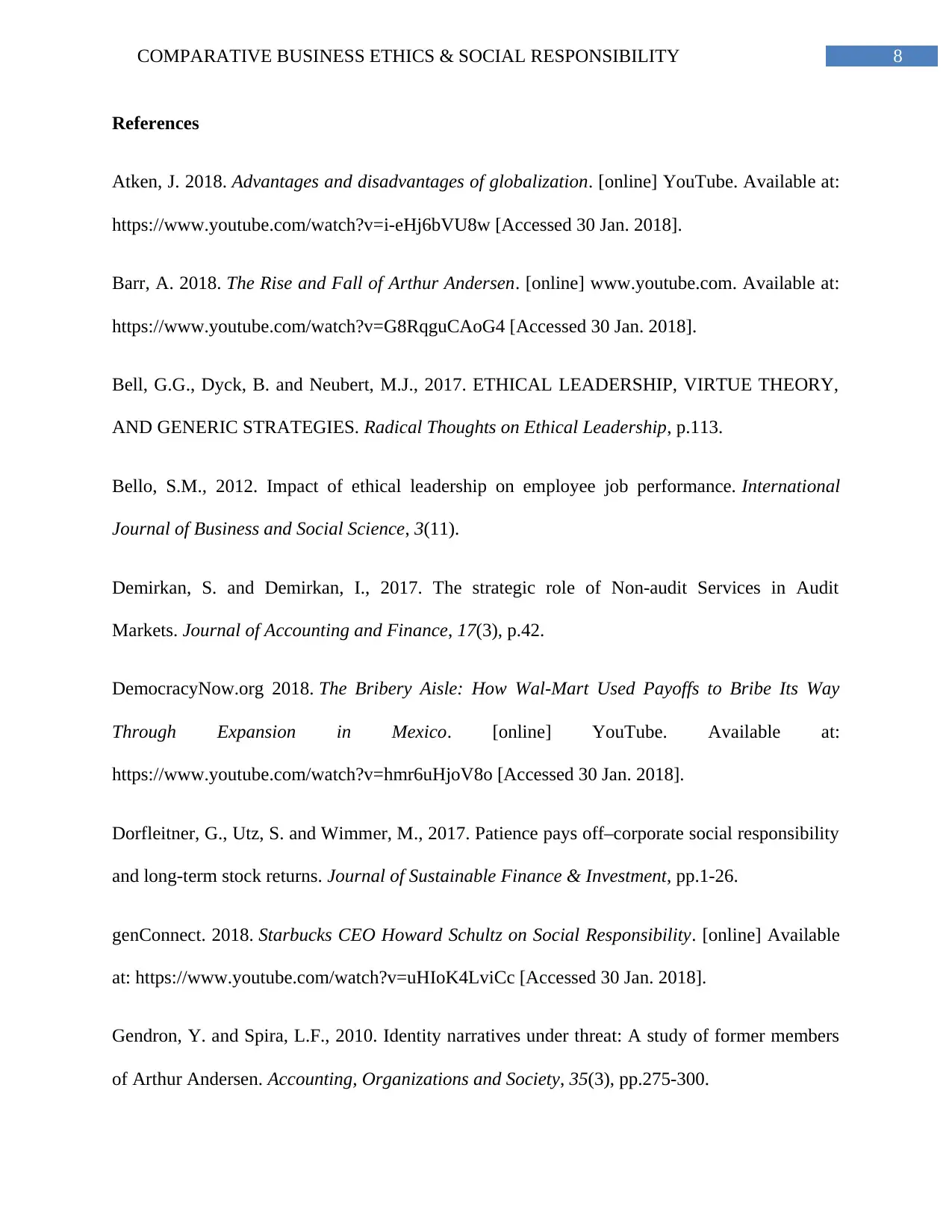
8COMPARATIVE BUSINESS ETHICS & SOCIAL RESPONSIBILITY
References
Atken, J. 2018. Advantages and disadvantages of globalization. [online] YouTube. Available at:
https://www.youtube.com/watch?v=i-eHj6bVU8w [Accessed 30 Jan. 2018].
Barr, A. 2018. The Rise and Fall of Arthur Andersen. [online] www.youtube.com. Available at:
https://www.youtube.com/watch?v=G8RqguCAoG4 [Accessed 30 Jan. 2018].
Bell, G.G., Dyck, B. and Neubert, M.J., 2017. ETHICAL LEADERSHIP, VIRTUE THEORY,
AND GENERIC STRATEGIES. Radical Thoughts on Ethical Leadership, p.113.
Bello, S.M., 2012. Impact of ethical leadership on employee job performance. International
Journal of Business and Social Science, 3(11).
Demirkan, S. and Demirkan, I., 2017. The strategic role of Non-audit Services in Audit
Markets. Journal of Accounting and Finance, 17(3), p.42.
DemocracyNow.org 2018. The Bribery Aisle: How Wal-Mart Used Payoffs to Bribe Its Way
Through Expansion in Mexico. [online] YouTube. Available at:
https://www.youtube.com/watch?v=hmr6uHjoV8o [Accessed 30 Jan. 2018].
Dorfleitner, G., Utz, S. and Wimmer, M., 2017. Patience pays off–corporate social responsibility
and long-term stock returns. Journal of Sustainable Finance & Investment, pp.1-26.
genConnect. 2018. Starbucks CEO Howard Schultz on Social Responsibility. [online] Available
at: https://www.youtube.com/watch?v=uHIoK4LviCc [Accessed 30 Jan. 2018].
Gendron, Y. and Spira, L.F., 2010. Identity narratives under threat: A study of former members
of Arthur Andersen. Accounting, Organizations and Society, 35(3), pp.275-300.
References
Atken, J. 2018. Advantages and disadvantages of globalization. [online] YouTube. Available at:
https://www.youtube.com/watch?v=i-eHj6bVU8w [Accessed 30 Jan. 2018].
Barr, A. 2018. The Rise and Fall of Arthur Andersen. [online] www.youtube.com. Available at:
https://www.youtube.com/watch?v=G8RqguCAoG4 [Accessed 30 Jan. 2018].
Bell, G.G., Dyck, B. and Neubert, M.J., 2017. ETHICAL LEADERSHIP, VIRTUE THEORY,
AND GENERIC STRATEGIES. Radical Thoughts on Ethical Leadership, p.113.
Bello, S.M., 2012. Impact of ethical leadership on employee job performance. International
Journal of Business and Social Science, 3(11).
Demirkan, S. and Demirkan, I., 2017. The strategic role of Non-audit Services in Audit
Markets. Journal of Accounting and Finance, 17(3), p.42.
DemocracyNow.org 2018. The Bribery Aisle: How Wal-Mart Used Payoffs to Bribe Its Way
Through Expansion in Mexico. [online] YouTube. Available at:
https://www.youtube.com/watch?v=hmr6uHjoV8o [Accessed 30 Jan. 2018].
Dorfleitner, G., Utz, S. and Wimmer, M., 2017. Patience pays off–corporate social responsibility
and long-term stock returns. Journal of Sustainable Finance & Investment, pp.1-26.
genConnect. 2018. Starbucks CEO Howard Schultz on Social Responsibility. [online] Available
at: https://www.youtube.com/watch?v=uHIoK4LviCc [Accessed 30 Jan. 2018].
Gendron, Y. and Spira, L.F., 2010. Identity narratives under threat: A study of former members
of Arthur Andersen. Accounting, Organizations and Society, 35(3), pp.275-300.
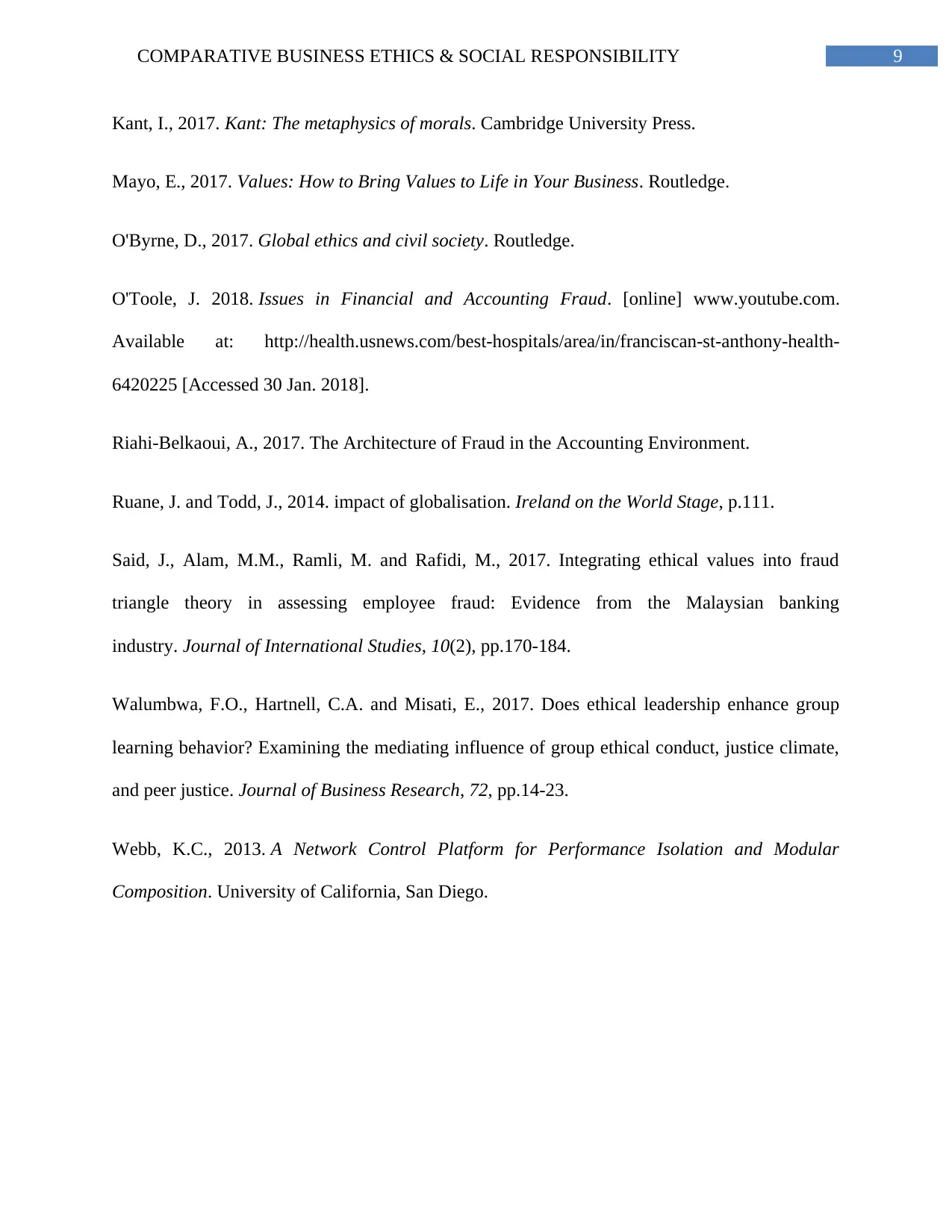
9COMPARATIVE BUSINESS ETHICS & SOCIAL RESPONSIBILITY
Kant, I., 2017. Kant: The metaphysics of morals. Cambridge University Press.
Mayo, E., 2017. Values: How to Bring Values to Life in Your Business. Routledge.
O'Byrne, D., 2017. Global ethics and civil society. Routledge.
O'Toole, J. 2018. Issues in Financial and Accounting Fraud. [online] www.youtube.com.
Available at: http://health.usnews.com/best-hospitals/area/in/franciscan-st-anthony-health-
6420225 [Accessed 30 Jan. 2018].
Riahi-Belkaoui, A., 2017. The Architecture of Fraud in the Accounting Environment.
Ruane, J. and Todd, J., 2014. impact of globalisation. Ireland on the World Stage, p.111.
Said, J., Alam, M.M., Ramli, M. and Rafidi, M., 2017. Integrating ethical values into fraud
triangle theory in assessing employee fraud: Evidence from the Malaysian banking
industry. Journal of International Studies, 10(2), pp.170-184.
Walumbwa, F.O., Hartnell, C.A. and Misati, E., 2017. Does ethical leadership enhance group
learning behavior? Examining the mediating influence of group ethical conduct, justice climate,
and peer justice. Journal of Business Research, 72, pp.14-23.
Webb, K.C., 2013. A Network Control Platform for Performance Isolation and Modular
Composition. University of California, San Diego.
Kant, I., 2017. Kant: The metaphysics of morals. Cambridge University Press.
Mayo, E., 2017. Values: How to Bring Values to Life in Your Business. Routledge.
O'Byrne, D., 2017. Global ethics and civil society. Routledge.
O'Toole, J. 2018. Issues in Financial and Accounting Fraud. [online] www.youtube.com.
Available at: http://health.usnews.com/best-hospitals/area/in/franciscan-st-anthony-health-
6420225 [Accessed 30 Jan. 2018].
Riahi-Belkaoui, A., 2017. The Architecture of Fraud in the Accounting Environment.
Ruane, J. and Todd, J., 2014. impact of globalisation. Ireland on the World Stage, p.111.
Said, J., Alam, M.M., Ramli, M. and Rafidi, M., 2017. Integrating ethical values into fraud
triangle theory in assessing employee fraud: Evidence from the Malaysian banking
industry. Journal of International Studies, 10(2), pp.170-184.
Walumbwa, F.O., Hartnell, C.A. and Misati, E., 2017. Does ethical leadership enhance group
learning behavior? Examining the mediating influence of group ethical conduct, justice climate,
and peer justice. Journal of Business Research, 72, pp.14-23.
Webb, K.C., 2013. A Network Control Platform for Performance Isolation and Modular
Composition. University of California, San Diego.
1 out of 10
Related Documents
Your All-in-One AI-Powered Toolkit for Academic Success.
+13062052269
info@desklib.com
Available 24*7 on WhatsApp / Email
![[object Object]](/_next/static/media/star-bottom.7253800d.svg)
Unlock your academic potential
© 2024 | Zucol Services PVT LTD | All rights reserved.




